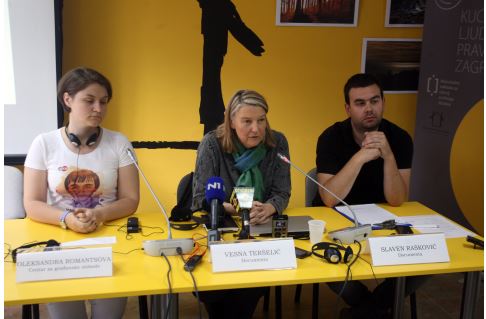Representatives of Ukrainian civil organisations said in Zagreb that they urgently needed international support to put more pressure on the authorities to document the serious human rights violations there.
The delegation is on a week-long visit to Croatia, at the invitation on Croatia’s Documenta Centre for Dealing with the Past, attending meetings and lectures on the documenting and research of human rights violations and war crimes in Croatia.
This cooperation programme with Ukraine has been endorsed by the Croatian Foreign Ministry. Before the Ukrainians, Documenta invited representatives of Palestinian and Georgian civil organisations.
“We want to prepare them for what awaits them when the conflict ends and show them how to avoid possible mistakes,” Documenta’s Slaven Raskovic told reporters, adding that the Ukrainians would talk with victims’ families in Vukovar just as they had begun to do with the victims in east Ukraine.
Oleksandra Romantsova of the Kiev Centre for Civil Liberties said they had just begun collecting data on who had died, gone missing or been beaten up. She said this was a difficult job because as soon as they arrived somewhere, they had to leave because the location was again under threat from occupation.
She said there were currently six million refugees, resettled and displaced persons in Ukraine and that the most important thing now was to collate the information and learn to better work with them. Croatia has a methodology for that and we trust the organisations involved in it, she added.
Romantsova said the Ukrainian civil organisations were cooperating well with Russian human rights organisations but criticised her government of passivity.
She said it was good that more and more civil society organisations in Ukraine were forcing the government to do something, such as pass a law on resettled persons, but that they also counted on international assistance so that pressure from two sides could force the authorities to respond more swiftly.
Documenta head Vesna Terselic said the police and legal capacities in Croatia in the 1990s had also not been enough to care for civilians and prosecute war crimes, stressing that international pressure had been very important and that she expected the EU to do the same in Ukraine’s case.
